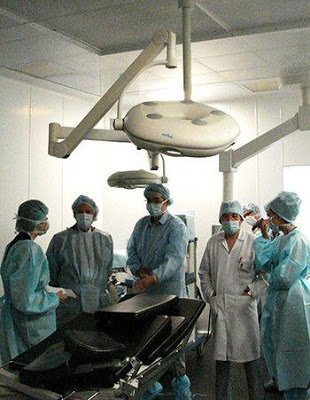Two physicians and a nurse from UPMC traveled to the National Research Emergency Hospital in Astana, Kazakhstan, in July, and they brought more than just a toothbrush and extra clothes in their suitcases. Instead, the trio brought with them all the medical equipment they needed to perform several cancer surgeries there.
David Bartlett, M.D., John Williams, M.D., and perioperative nurse specialist Sharon Hess, B.S.N., R.N., had spent several weeks working with doctors in Kazakhstan to identify patients they could help once they arrived while also assessing the hospital’s capabilities as part of a recent collaboration between UPMC and the eastern European nation.
In all, the UPMC team performed seven surgeries over four days there, including liver resections, a Whipple surgery for pancreatic cancer and a laparoscopic colectomy.
One case involved a woman in her 40s who had rectal cancer. Because of the location of the cancer and her large size, Kazakh doctors didn’t think they could successfully operate on her, but Dr. Bartlett and his UPMC colleagues were able to remove the tumor while also preserving important muscles in the area.
“Our sense is that while they do some of the procedures, they are not really comfortable with all of them. And in some cases, they don’t have all of the proper equipment so it was essential that we brought everything we needed with us,” said Dr. Bartlett, chief of the Division of Surgical Oncology at the UPMC CancerCenter, a partner with the University of Pittsburgh Cancer Institute, the only National Cancer Institute-designated comprehensive cancer center in western Pennsylvania.
Doctors from Kazakhstan assisted in the surgeries, including one surgeon who had trained in Turkey and spoke enough English to act as a translator between the two groups.
In May 2013, UPMC announced it had been selected by Nazarbayev University in Kazakhstan to implement a UPMC-created plan for a 300-bed hospital, research center and outpatient radiation and medical oncology program in that country’s capital. The National Research Oncology Center (NROC) in Astana is funded by the government and designed to dramatically improve cancer survival rates in Kazakhstan. More than 30,000 new cases of cancer are detected in Kazakhstan annually—with over half of all cancer patients being diagnosed at a late stage.
The center will incorporate the tactics used by UPMC to successfully integrate care, research and medical education at UPMC CancerCenter and its more than 35 locations in western Pennsylvania, Ireland and Italy.
“We have processes for everything we do – from draping a patient in the operating room to how we make the first incision – and incorporating these into their system can really make outcomes better for their patients,” said Dr. Williams, chair of anesthesiology at the University of Pittsburgh Schools of the Health Sciences.
The next step in the assessment will involve bringing the Kazakh surgeons to the U.S.
“We’re really excited to bring them to UPMC and show them our capabilities,” Dr. Bartlett said. “And we’re excited about sharing our clinical and research knowledge with these surgeons so they can provide the best care possible to their patients.”









